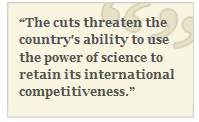|
|
|
|
|
|
|
News & Views item - October 2010 |
![]() Former
UK Chief Scientific Advisor Warns of a Bumpy Road Ahead for Research.
(October 28, 2010)
Former
UK Chief Scientific Advisor Warns of a Bumpy Road Ahead for Research.
(October 28, 2010)
 Professor
David King was chief scientific adviser to the UK government from 2000 to 2007.
He now directs the Smith School of Enterprise and the Environment at the
University of Oxford.
Professor
David King was chief scientific adviser to the UK government from 2000 to 2007.
He now directs the Smith School of Enterprise and the Environment at the
University of Oxford.
In an opinion piece for this week's Nature entitled "Spending review leaves research in the lurch" Professor King warns: "A revised research spending plan won't meet the challenges Britain faces from its international competitors or from climate change."
While he agrees that: "Although other [governmental] departments saw an average
of 19% shorn off their annual funding, science got off relatively lightly," and
that the "United Kingdom's research budget was frozen but not cut, meaning an effective reduction of some 10–12%,"
what exercises the UK's former chief scientific advisor is the devil in the
unspoken detail.
budget was frozen but not cut, meaning an effective reduction of some 10–12%,"
what exercises the UK's former chief scientific advisor is the devil in the
unspoken detail.
"[T]here are two main problems. First, we do not yet know the indirect effect that the cuts to university teaching budgets will have on research, nor how much they can be offset by increased student fees. Second, and perhaps more important for the research community, because the funding for large international collaborations such as CERN, Europe's particle-physics laboratory near Geneva, Switzerland, has to be ring-fenced, most of the cuts will fall on shorter-term, more timely pieces of research."
As a result "certain research councils face a far larger percentage cut", and Professor King cites the example of the Engineering and Physical Sciences Research Council which has few long term commitments and as a result only a fraction of its allocation will be "ring-fenced". He warns that there may even be "funding rounds in which it is unable to allocate any grants at all. This in turn means that timely ideas could fall by the wayside, or be taken up by international competitors". He notes that the ten-year strategy set out in 2004, while he was chief scientific advisor, "by the previous government's science and investment framework pledged to continue to increase the science budget each year by twice the rate of growth in gross domestic product (GDP) (but not to reduce the budget if GDP contracted, as it has done recently)".
Finally, he points to China, the United States and the European Research Area Board which "calls for radical action, including the establishment of a single market for research and development. And in the past few months, "both France and Germany have published national strategies showing their commitment to investing in research". He concludes: "So, although the cut in the UK science budget is lighter than I had feared, I still believe that it threatens the country's ability to use the power of science research to retain its international competitiveness. Just as importantly, it threatens the country's ability to decarbonize the economy.
However, as a small consolation Professor Kings notes: "at least the Department of Energy and Climate Change and the Department for Environment, Food and Rural Affairs [have have their funding reinforced]. This will be crucial if Britain is to stick to its commitment of reducing carbon dioxide emissions by 34% by 2020... [Nevertheless] the danger of the freeze proposed by the present government is that it could stall the whole process just as it is taking off. In the meantime, watch out for a bloodbath as scarce resources are divided between the research councils this winter."